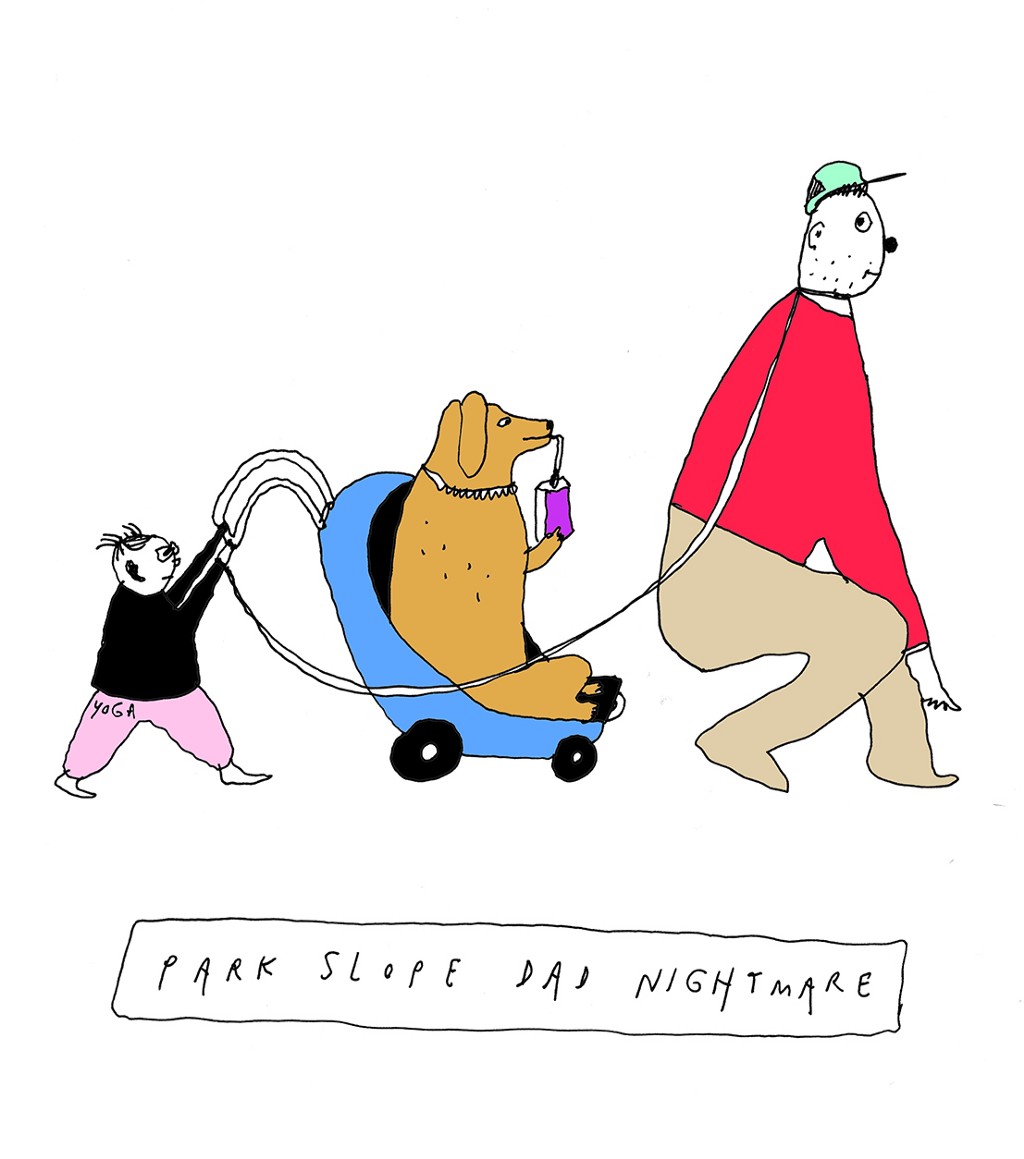Jared Kushner Calls His Mom
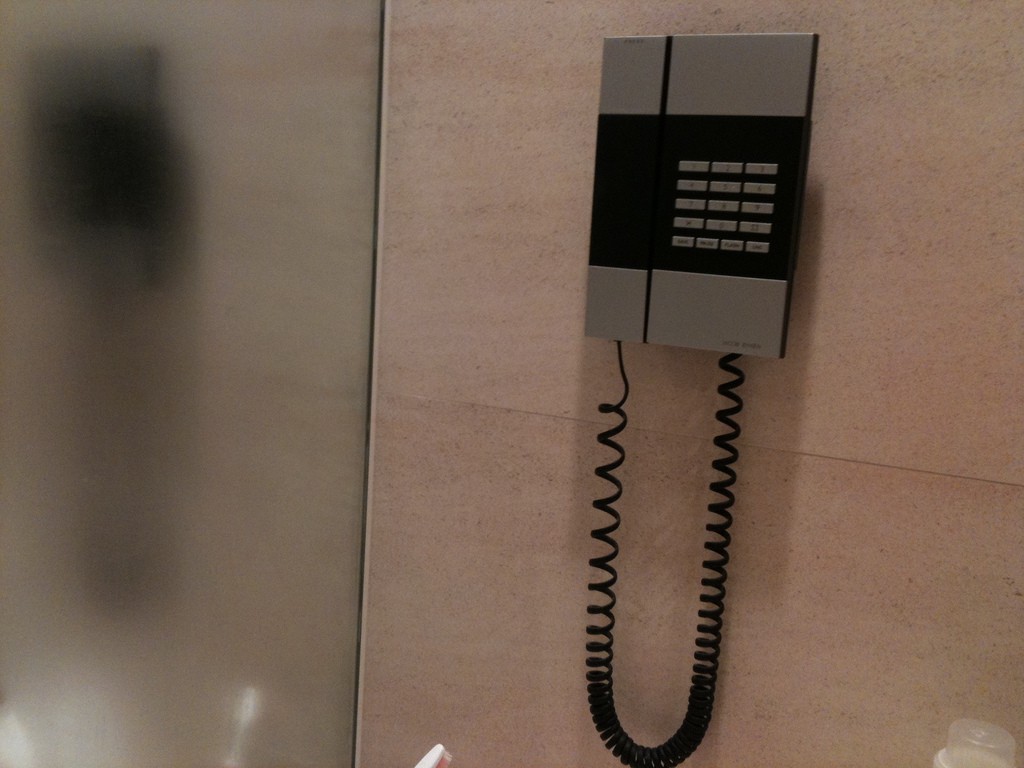
It’s six months ago. Donald Trump’s unexpected victory is still stunning everyone, including JARED and IVANKA, who now must move to Washington, D.C. to work in the administration. IVANKA is packing up and speaking sternly to her closest friends (her staff). JARED is making one thousand phone calls to his mother, the only way he knows to cope with anxiety.
JARED [calling his mother for the thirtieth time]: Mom, where is that pot I used to make ramen noodles in. Ivanka said that Washington is a backwater and they won’t have my favorite restaurants.
JARED’S MOM [matter of factly]: Jared, we gave all the things in your dorm room away, to Stefa’s son when he was attending SUNY Purchase.
JARED [pissed but mostly for show]: Mom, that was my stuff. Not the fucking cleaning lady’s.
JARED’S MOM: Jared, Stefa helped raise you when I was distant, and sitting on corporate boards. Don’t talk that way.
JARED [wondering whether he learned anything at college]: What about my Microeconomics textbook? Like just the intro one. It had a purple cover I think.
JARED’S MOM: We sold all those books back to Amazon
IVANKA [interrupting, powerfully]: Jeff Bezos is now a foe. He owns fake media.
JARED [to IVANKA]: How did you —
JARED’S MOM: Is that Ivanka? Why don’t you ask her where your things are?
JARED [appeasing IVANKA]: Mom, Jeff Bezos hates us. How many times do I have to tell you that?
JARED’S MOM: Well I’m not getting rid of my Alexa. There is just no way. Goodbye.
JARED and IVANKA continue packing. IVANKA tells movers to leave everything where it is, except for the fainting couch, which they should cover in bubble wrap this evening, and transport to the new home so it’s there when the family arrives next week. JARED calls his mother a lot more.
JARED [calling his mother for the hundred and sixth time]: People test our food before we get to eat it.
JARED’S MOM [sweetly]: Jared, you’ll never guess who I saw at Whole Foods. I thought he was working with you now?
JARED [pouring himself a bowl of Cheerios and then not eating it]: Who, Mom?
JARED’S MOM: He was very friendly.
JARED [dumping his cereal into the trash]: Who, Mom?
JARED’S MOM: And I said, I shouldn’t be speaking to you, ever again, but I had to know. Why was he riding a motorized scooter. Have you ever tried parking at Whole Foods before, he said. They make the spots smaller than other parking lots. It’s true. They do. I asked your father. The spots marked handicapped are much roomier though, he said. And he pointed to his black Suburban with the —
JARED: Who are you talking about mom?
JARED’S MOM: I have to go. Stefa is here for lunch. She brought her chicken salad.
IVANKA [handing JARED a list of Russian people.]: Call this man. He — [IVANKA turns on the hair dryer she is holding.] — Euros and then dollars. Our lawyer can credibly say that you made a thousand calls. [IVANKA glares at JARED.] Because you have made a thousand calls.
JARED [nervously]: What will I say to them?
IVANKA [synergistically]: That’s the beauty of a back channel. You say whatever you’d like as long as it furthers our interests.
JARED imagines a water slide into Russia originating in Alaska, maybe. Wouldn’t that be cold, he wonders, as he calls his mother for the four hundred and seventy-third time.
JARED [filling out paperwork]: What’s the mnemonic of my allergies again? The Secret Service is having us fill out entrance interviews.
JARED’S MOM: SIPPY CUP, but cup with two Ps. Soy, insect repellent, pistachios, peanuts, and Yoohoo or other artificially flavored drink. Cashews, unpasteurized dairy, perfumed laundry detergent, and pork.
JARED [testing his boundaries]: I’m not allergic to pork.
JARED’S MOM: How would you know?
IVANKA hands JARED another number to call.
JARED: I’ll call you back in a second, Mom. [JARED dials RUSSIA.] Hi, Mr. Kislyak. It’s Jared again. So about Rosneft —
IVANKA directs her staff to plug in the Vitamix and make juice for everyone present. The whirring masks JARED’S probably treasonous communications. IVANKA exits to cancel the family ski trip they had scheduled during Hillary’s inauguration. JARED calls his mother for the nine hundred ninety-seventh time.
JARED [screaming]: Josh doesn’t have to move.
JARED’S MOM: Yes, well, Josh isn’t married yet.
JARED [screaming]: You said he was definitely going to lose! You said I was going to launch a television network!
JARED’S MOM: Your father always said that was a dumb idea.
JARED [whispering]: Ivanka says you bring up dad to derail me.
JARED’S MOM: Oh Jared. Do you remember our first house? The one with the kitchen on the same floor as the bedrooms. And you’d wear the colander on your head and say you were the Tin Man and Joshie would wear one of my furs and be the Cowardly Lion.
JARED [calming down]: And the cleaning lady was the Scarecrow.
JARED’S MOM: Stefa, Jared. We were just saying, Stefa and I, when she was over for lunch, how you’re the Cowardly Lion, now.
JARED [lying]: That’s not true.
JARED’S MOM: If only you were brave.
STEVE BANNON barges into the room, pushing a grocery cart full of Andre champagne. He lines up four of the bottles on IVANKA’s fainting couch and then opens them with the samurai sword he bought from Amazon to congratulate himself for helping to accomplish the unthinkable. He is also on the phone, but not with Russian spies.
STEVE BANNON [yelling into his phone]: He goes, we have to move there? And I go, real nice. Real nice. That fucker thinks globalization rendered geography moot. [STEVE BANNON glares at JARED KUSHNER.] Oh wait. He is right here.
JARED slinks to the bathroom and, for the nine hundred and ninety-eighth time, calls his mother, who he impulsively disconnected.
JARED’S MOM [picking up where she left off]: David Brooks was at your father’s minyan this morning. He said Hillary lost because low-wage workers don’t find meaning in their mundane job responsibilities anymore. If he were the Democrats, he said, he would send a copy of The Power of Now to every displaced factory worker in the Rust Belt. And he’d rename the party the ‘Presenticrats.’ Such an intelligent man. Presence is so important, Jared.
JARED [distractedly]: Mom, where is my windbreaker? You know, the one that I wear when I take the helicopter. Josh calls it “the cool one.”
JARED’S MOM: William Henry Harrison died because he didn’t wear an overcoat to his inauguration.
JARED [composing himself]: Mom, this is for summer or spring. Ivanka says we will be down there year-round for the first two years at least.
JARED’S MOM: Jared, how would I know where that stuff is? You haven’t lived with me for over ten years. Not that I wouldn’t love to have you back.
IVANKA slides three more telephone numbers under the bathroom door as she and STEVE BANNON clink glasses. JARED looks at himself in the mirror and imagines wearing his cool windbreaker inside the back channel.
Bryant Park Whole Foods
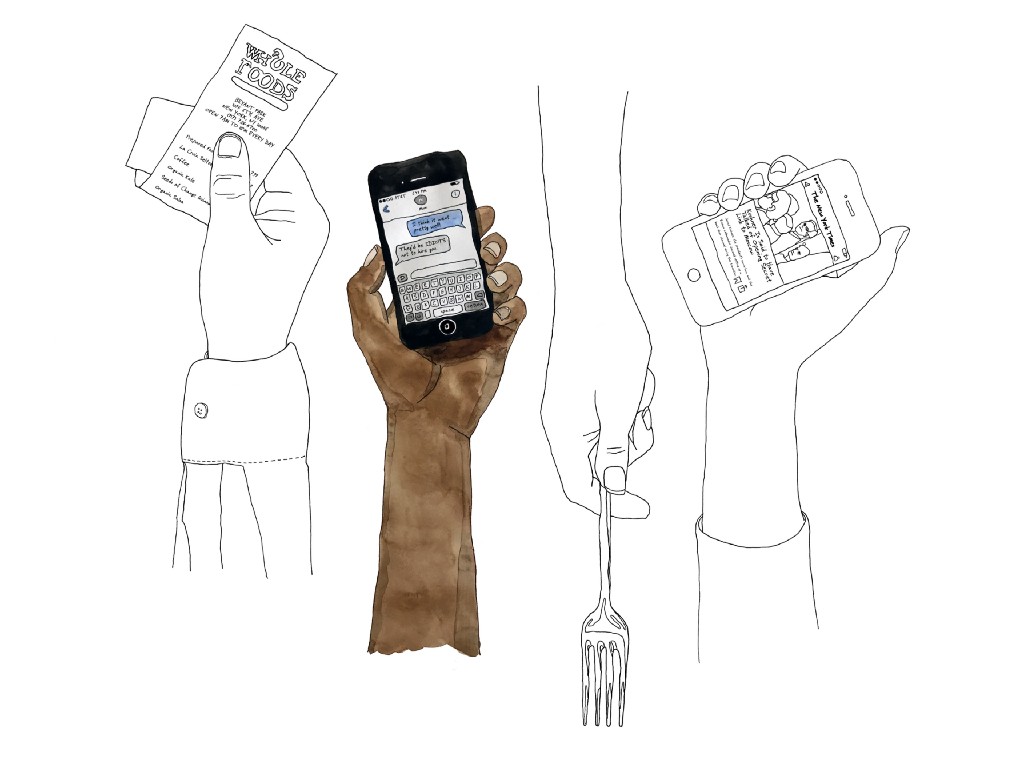
Illustration: Forsyth Harmon
Two ways to dine alone in the Bryant Park Whole Foods: The best, most coveted option is to claim one of the stools at the windows, where you can sit in a kind of blinkered solitude, side by side with others, but facing no one, your back to all the hellscape behind you, resting your eyes on canted plane trees, and the diffident marble behind of the library, and Sixth Avenue silent through the glass. Regarding all this, in your public privacy, you might feel yourself some sort of protagonist. Which is the same thing as saying that a high stool facing Sixth Avenue at the Bryant Park Whole Foods is the best place to cry in Midtown.
The problem is, the stools are popular. They tend to form an unbroken wall of elevated human backs, blocking out the light, which makes sitting at one of the jammed-in picnic tables — a lower elevation — even less desirable. (Why is it that it feels so much better to be seated higher when alone? That a perch at the bar affords a sort of aloof chic but a seat for one at an earthbound table just feels sad?) The second way to dine alone at the Bryant Park Whole Foods then, is sitting among and opposite strangers, facing one another.
When I took the seat across from you, with some tentative “May I…?” gesture, you exuded so much amiable energy in your assent, that I recanted all my life’s eye rolls at the phrase “a beautiful aura.” Because yes, yours was one of pure loveliness. In my mind, you were wearing pink, but now I think maybe you were just emanating a kind of rose quartz glow. You were young, black, with short hair and wide-awake eyes.
You complimented my pants and I told you they were new and then we had that kind of small talk between women, which, in both its smallness and in its surprised quality (here we are, two perfect strangers, having a nice chat!) and the mutual acknowledgement of both, seems uncommonly sweet. It seemed to kindle something so expansive and optimistic that it freed the phrase “small talk” from the jeer of triviality. “Small” was no longer trite, superficial, meaningless, asinine. “Small”, instead, was modest, tender, gentle and deliberate. Not “small talk” but “A small talk.” Like a small pause, or a small snack.
I had my brown cardboard box of dinner and you had yours and your general pleasure made me forget my sourness of a moment earlier: the guy at the checkout had said, “enjoy your dinner” as he handed me my receipt and, hearing a kind of snark, I’d said thanks and thought fuck you. You don’t tell someone to enjoy their dinner when she’s solo and buying a cardboard box of kale at 6 p.m. But if I were someone like you — you in your rosiness —I probably wouldn’t have felt a slight in the valediction. You were enjoying your dinner!
We were nearly all women. Women with their boxes of Prepared Foods at eight dollars a pound. A sort of sad sorority of women eating alone, together. Or maybe not sad. Maybe just a sorority. How much alone-ness to grant and how much to deny? I occupied myself with my laptop and my salad and yes, my phone too — checking nothing, urgently — but of course I couldn’t not hear you talking. You were on the phone now, and talking quietly, but of course you were right there. While I chewed quinoa and looked at my screens, I learned that you’d had a job interview and you thought it had gone pretty well and they’d all seemed nice, but smart too and, yeah you were excited about it. And as you talked, I became invested. I really wanted you to get the job. I decided, with an inappropriate degree of vehemence and allegiance, that you were definitely going to get this job and you definitely deserved this job. It was the kind of feeling that makes a woman’s best friend roar, “They’d be IDIOTS not to hire you.”
Later, when I got up to leave, I wondered whether to say something and it was the wondering, the hesitation of it, that probably made it come out wrong. “I hope you get the job!” I said, but you looked startled. You said “thanks” but I could tell that beneath it, your thanks, like mine at the checkout earlier, had the mild fuck you of resistance at a boundary breached by a stranger.
> Obama + kids
From Everything Changes, the Awl’s newsletter. Subscribe here.
I made another Twitter bot. This one delivers one happy post every couple of hours. It’s called @ObamaPlusKids.
The bot posts pictures (mostly by former White House photographer Pete Souza) of adorable children interacting with an adult they seem to inherently feel they can trust. For me it serves as a regular little reminder that good things exist in the world.
Feel free to follow, or not if it’s not your thing. And have a nice weekend.

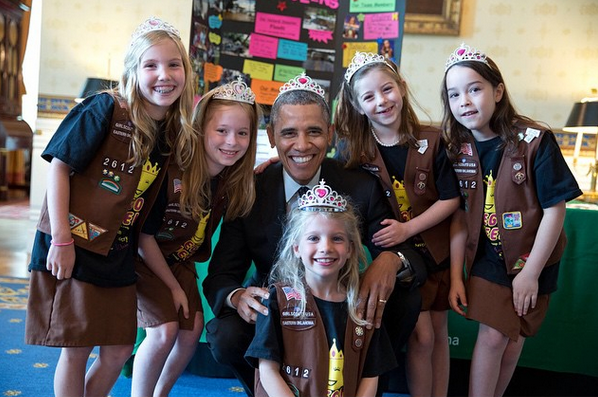
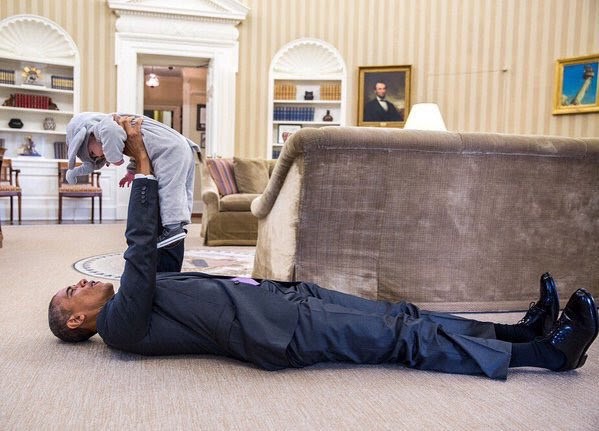
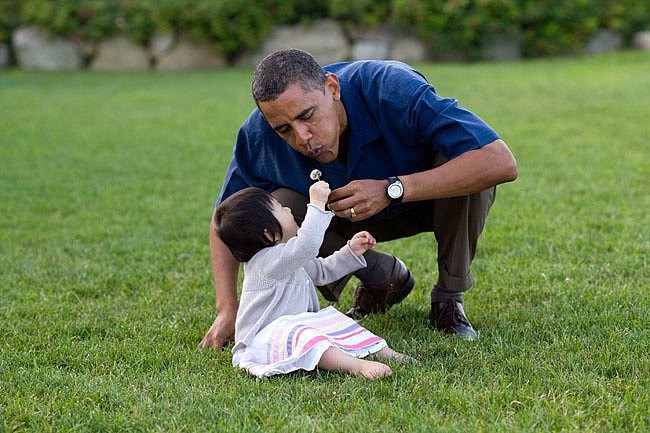


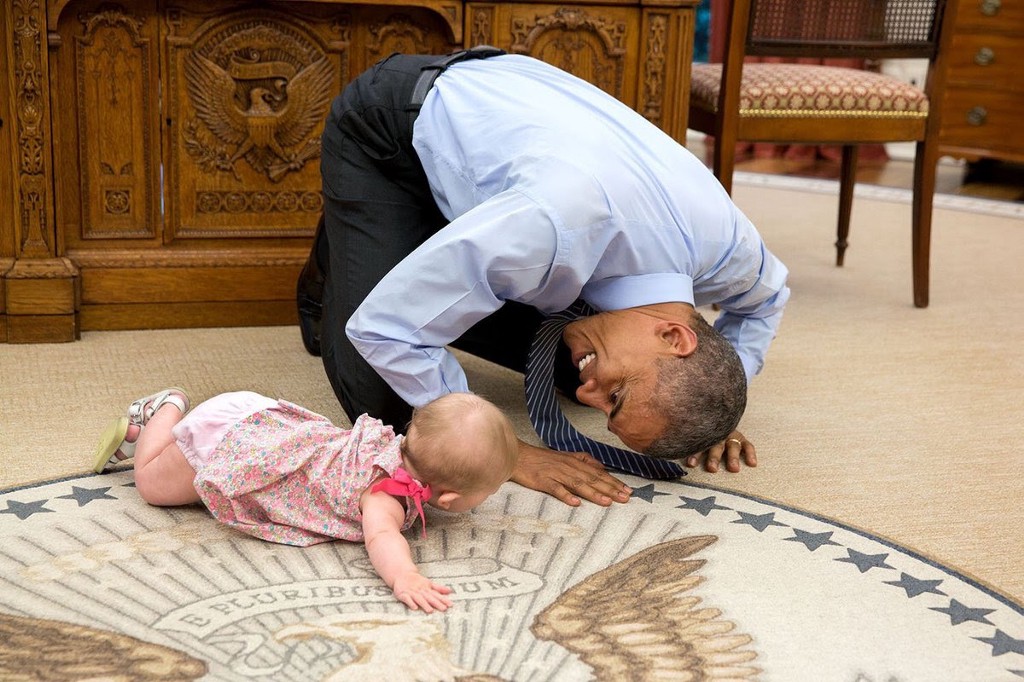
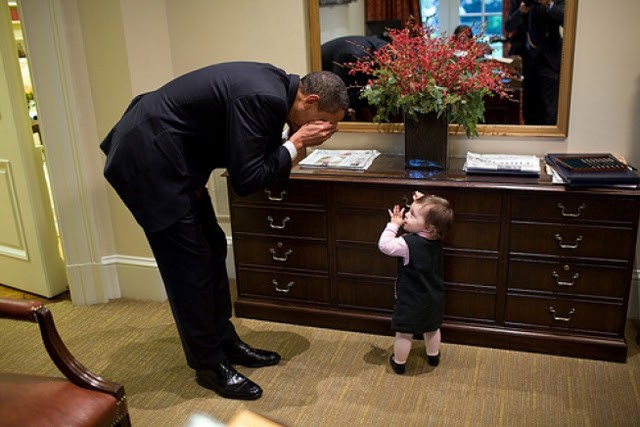

From Everything Changes, the Awl’s newsletter. Subscribe here.
Anton Kubikov, "North"
Give me something pretty to make me forget.

Do you remember what it was like to wake up happy? I myself do not. Of course, I have always been this way. Even as a child I was suffused with a sense of sadness so steadfast that the rare occasions of joy I experienced struck me as worrisome signs of incipient danger. So I am unable to recall the feeling of opening my eyes and being excited for what the day would bring. But I’m not like you. I expect your life has been a run of pleasant mornings, an endless stretch of days where you bounced out of bed ready to take on whatever came at you, confident that once it was in your embrace it would love you back. I bet it even worked for a while. But now… well, you know. I don’t need to tell you what it’s like now when you wake up and realize where you are — where we all are. As someone who has felt this way virtually his entire life I can offer both sympathy and empathy, but also confirmation that this is about as bad as it has been. Does that help? Probably not. You know what might? This absolutely delightful track, which will make you happy enough for seven minutes that once you come back to reality there will still be a little bit of a warm feeling wrapped around your brain. It’s not a lot but it’s all I’ve got, and I don’t know that anyone else has anything better. Enjoy.
New York City, May 31, 2017

★★★ The soggy old morning dried out into brightness. After days of gray, the uncovered sky stung the eyes a little. A tiny dog on a leash leaped at a merely small dog being walked by someoen else. The sun looked cobwebby in a grimy curbside puddle. The light was clear, the air soft and heavy. Children munched on ice cream sandwiches in the forecourt. There was time and light for tossing a baseball around while the moon overhead grew brighter and sharper in the slow-arriving dusk.
I Told You You Couldn't Sweat Out Toxins
But I do understand that a sauna feels nice.

I was able to reach Eric P. Widmaier, Hershel Raff, and Kevin T. Strang, through email. Is this claim substantiated by what is found in Vander’s Human Physiology? Maybe you would like to pause in your reading for suspense. OK. The answer is: No. They each told me that it is not. “We do discuss that sweat contains salt (sodium and chloride) that can represent a large loss of electrolytes with a large volume of sweat (e.g. exercising on a hot day),” Raff said. Very tiny amounts of lead, copper, and nickel do appear in sweat, but if you have dangerously high concentrations of these metals in your body it is probably best that you visit a hospital rather than an infrared sauna.
Infrared Saunas Will Not ‘Detoxify’ You
Our pal and Hairpin blogger Kelly Conaboy went to an infrared sauna for The Atlantic and guess what she found (besides a nice warm place to listen to Brian Eno)… Spoiler alert: the main thing your sweat contains is SALT.
All Spicy Food Is From Latin America
Deep globalization is real.

If you ever go to Asia (do not do this, it is too big, and trying to comprehend it will only convince you that your mind was never meant to really comprehend anything) and you want to put all the attention rightly back on yourself, the important American, here is a little trick you can use. First, be in one of the countries that makes really spicy food, and then performatively eat stupid amounts of it in front of everyone. Hurt yourself badly, but pretend like you do this all the time. Probably, everyone will laugh and someone will say, “Whoa! Usually Western people don’t like chilis.”
This is your chance. Lean forward, sweating like a giant asshole, wink, and say, “Actually, all spicy food is from the West. Chilis come from Central and South America, and they were brought over here after Spanish colonization. None of your chilis are native to Asia.”
People will probably want to fight you. Because obviously, this is what is called a huge “dick move” in every language on Earth. I personally have a bit of Mexican heritage, and a small chip on my shoulder about the fact that the agricultural and civilizational achievements of Pre-Columbian Meso-America are insufficiently recognized (in 1492, the Aztec capital of Tenochtitlan was larger than any European city, until Spaniards destroyed it).
That said, many Indonesians, or Malaysians, etc., do know the botanical history of the capsicum, just like some Texans know that conquistadores actually brought over their “longhorns” and many Italians know that pasta is probably originally Arab (not Chinese, like in that Marco Polo story, which is fake) and that their famous red sauces often lean pretty hard on the Central American tomatl, (one of a few words from Nahuatl that actually traveled into Western European society, instead of the other way around).
But for people in India or Thailand who don’t know that all spicy food is from the Americas, it can be pretty jarring. Here’s a conversation I just had with a well-educated, multilingual Indonesian.
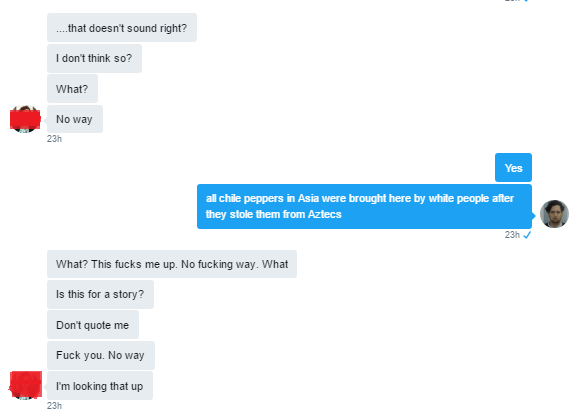
Actually, I lied a little bit. All chilis in Asia were brought over here by white people after they stole them from not just the Aztecs, but also the Incas, and many other native American peoples. I don’t blame her! It feels fucking weird. They’ve been a part of local cuisine for centuries. They grow everywhere. They are part of local identity. They are nature.

She got really mad at me, and I understand why. There is a lot about deep globalization and its effects that is so counterintuitive that it’s hard to process easily. We have been changing the world in strange ways for a long time. But humans have stupid primate brains, and we tend to naturalize whatever is right in front of us.
The world looks flat. Actually, the floor of the world, a creation of our senses, is indeed flat, it’s just the actual physical Earth that is technically curved. So yes, it was pretty messed up what they did to Galileo, but I get it. If some know-it-all came up to me in the 1600s and said, “well, Actually, no, the Earth is spinning around the Sun,” I would want to fuck him up too. I’d think, there’s just no way that is true, and either way, this guy is being a huge dick.
But, the chili thing is true. Everything that is spicy is a member of the capsicum genus, which is native to the Americas. To the extent that things like wasabe, horseradish, or black pepper sometimes feel like they light you up in a similar way, it’s not because of capsaicin. Nothing but chilis register on the Scoville scale. The fruit of the capsicum is what we call the chili pepper, which might be quite hot, like a habanero, or very mild, like the bell pepper. Some are small, some are big, most are bright and beautiful. They have undergone plenty of changes since 1492, both intentional and accidental. But, those chilis weren’t just hanging “naturally” in the North American Garden of Eden. Native Americans had cultivated them for thousands of years.
The fact that, when talking of the capsicum family, we say that chili “peppers” are “spicy,” means we are committing a double linguistic anachronism (which is fine). It was of course “spices” that all those Spanish and Portuguese were looking for (especially black pepper) in Indonesia in the first place. And since chilis kinda make your mouth pop in the same way as black pepper, they got named “peppers,” and we call them “spicy,” though the biology and sensation produced are actually totally different. The word “Chili” itself is Nahuatl.
Consider again how stupid humans are. These Iberian adventurers cast out across the world, on very shitty boats, because they wanted some of this little powder that makes your mouth tingle a bit at dinner. They went around the world, destroying civilizations and starting new ones, because their meals back home were boring without it.
In a few hundred years, we may look back at our own times, and think it was just as insane that we privileged deregulated financial capitalism and #branding over all other possible versions of globalization, remaking the world in the image of Coldplay and Uber rather than, say, universalizing democracy or labor rights.
500 years after our round of globalization has ended, it may be possible to think that strip mall parking lots and KFC are literally part of nature. Or that you might get punched in the face if you say that English is Actually from a country that used to be called England, not the official language of the United Amero Zone (the UAZ, pronounced “WAZ”).

I recently moved from Brazil to Indonesia for work, and I recently got hit hard by a moment of deep globalization. Both countries are big (Brazil has world’s 5th-biggest population, Indonesia is #4) and “developing,” but other than that my move was fairly random, dictated by a few personal connections and the vagaries of the journalism market.
So imagine my surprise when I started learning Bahasa Indonesia, the Malay dialect picked to be the national language here not too many decades ago. It’s an Austronesian tongue with essentially no grammar, and no family relation even to mainland Asia, let alone to Indo-European languages. But something happened as I learned a number of really basic words, all the kind of thing you’d learn in a high school Spanish chapter entitled “Around The House.”
cepatu = shoe
meja = table
jandela = window
kameja = shirt
bangku = bench / chair
Those words are just Portuguese, with like maybe one letter changed. Of course, of course, I looked it up and it turns out there’s a lot more words that were adopted into Malay as the Portuguese were active around here, starting in the 1500s. Indonesians do know about this linguistic history. But I had a really hard time taking it in. I checked with lots of Brazilians, and they all thought it was insane, too. This is not like when you hear Portuguese in Mozambique or Angola or East Timor — that’s normal. That’s modern colonialism, that was recent full nation-state domination. These are huge living artifacts, plain as day, left by men just trading nearby, hundreds of years before the US was founded.
Something weirder was happening here, too. These kind of loanwords usually enter a language because there’s no local concept for them. Shit, does this mean that shoes, tables, and shirts are inventions? Well of course they are, fuck, fuck. Ok, fine, that seems fairly benign compared to some of the other effects of various globalizations. But out of all the globalizations that have ever happened and ever will happen, perhaps the spread of the chili is the best one, because chilis are amazing.
A year or so ago on the USA internet, there was a set of pretty hilarious jokes about how white people eat food with no flavor. Even more hilariously, some white people got mad and thought it was racist. Between men and women, preferences for spicy food are as hilarious as you’d expect. One study suggests that women actually like the taste more, while men are often more into the way they think it makes them look cool. Especially in front of women.
But globally speaking, it’s not really your ethnicity or your gender that determines how spicy you eat, but where you’re from. In Mexico and Northeastern Brazil, white people (yes, they exist) eat loads of spicy food. Down in colder, whiter, Southern South America, mayonnaise is about the spiciest thing most people eat. In Chile, Argentina, or Uruguay, an entire meal might be a breaded steak (no seasoning) and some potato salad, or just french fries topped with cheese, deli ham and — if you’re lucky — a pinch of oregano.
There are a few theories as to why certain societies started really earnestly using chilis. One is that they act as a relatively effective antimicrobial, which could help safety and preservation, especially in hot climates. Another is that it’s pleasant to feel warmer, and then sweat a bit, especially in hot climates. This has something in common with the practice of drinking hot tea in places like India, but there is a difference — hot water really does increase your body temperature, whereas spicy food only tricks your body into thinking it’s burning. Another theory is that the euphoria that comes after the initial (harmless) pain is pretty fun. And one more is that it results from a simple lack of food. Eating spicy makes it feel like you ate more, and it makes it easier to choke down bland starches. This is why some people diet using loads of hot sauce. Anthony Reid thinks that Southeast Asia first got really wild about chili when the Japanese globalized into, I mean, invaded the region during WWII and food became scarce.
But I have my own theory why societies don’t stop eating chilis once they start. It’s because it’s nice to feel more things and taste more tastes along with your food, and once you realize nothing bad ever happens, it’s a quick and easy upgrade. It also means that you can ingest ancient magic Aztec energy, which is real, every day forever.
How To Get Angela Merkel Back For Good
Deutschland ohne us.
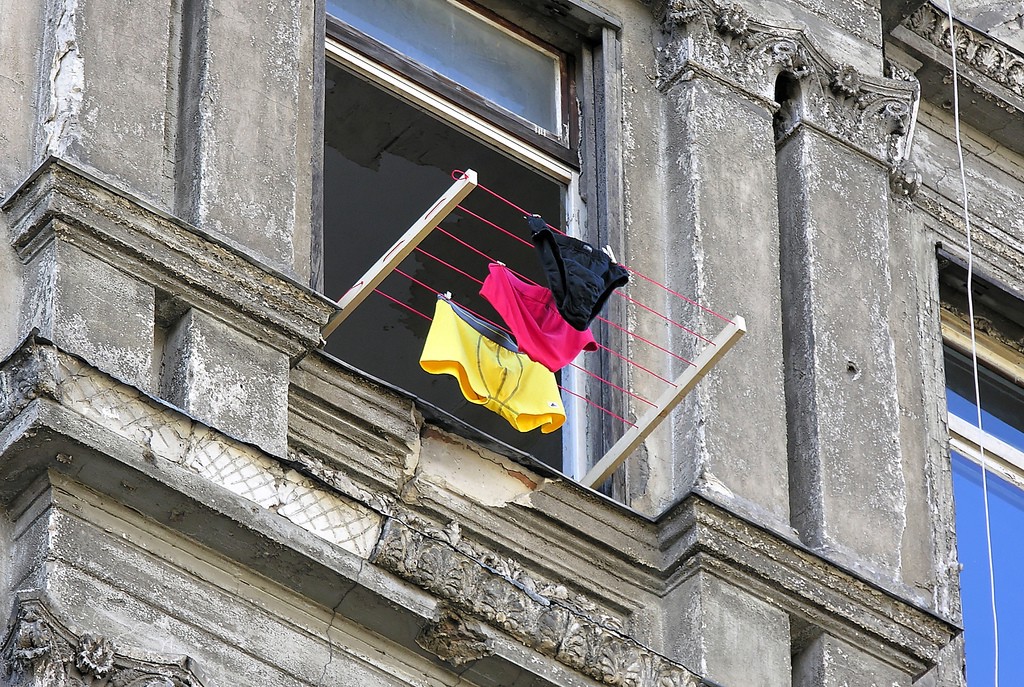
We thought she’d be weak without us but she’s stronger. Thought she’d be broke without us, but she’s richer. We thought she’d be sad without us; she’s pounding pilsner.
Merkel after mtg w/Trump: “times in which we could rely fully on others, they are somewhat over” https://t.co/qRQJocGiIo Then she did this:
The German term for dumping someone is jemandem den Laufpass geben (YAY-mon-dum dayn LOUF-poss GAY-bun), and literally means “to give someone his discharge papers,” a.k.a. the veritable dispensation of a giant cosmic jackboot, ejecting one from the army of love. (Don’t blame me for the Germans’ weird metaphors, man.) My fellow Americans, it’s not hard to read the beer foam: Angela has dumped us. She’s publicly changed her relationship status from ES IST KOMPLIZIERT to GO FUCK YOURSELF. She’s blocked us on Snapchat. She’s swiped whatever direction you swipe when you reject someone. She’s given us the Laufpass, and she’s fucking loving every second of it.
But it’s cool. We’re fine without her. Like, we’re doing really, really, really, really, really, really, really, really, really, really, really, really, really, really, really, really, really, really, really, really, really, really, really, really, really, really, really, really, really, really, really, really, really, really, really, really, really, really, really, really, really, really, really, really, really, really, really, really, really, really, really, really, really, really, really, really, really, really, really, really, really, really, really, really, really, really, really, really, really, really, really, really, really, really, really, really, really, really, really, really, really, really, really, really, really, really great. Better than ever.
But let’s say, just for the sake of a thought experiment — something we now really enjoy doing as, like, a hobby, with all of the time we no longer have to spend on our RELATIONSHIP — we wanted to see if we could get her back.
The first thing we’d realize, after a few failed attempts with a boombox and the Dolly Parton version of “I Will Always Love You,” is that grand romantic gestures do not have any discernible effect on a people who detest any display of public emotion that is not directly related to Robbie Williams leaving Take That or soccer (more on that in a minute).
No, everybody knows that if we wanna win back our lover, we gotta get with her friends. We must ingratiate ourselves into, and make ourselves indispensable to, her posse, as my mother still calls a group of people who hang out together because she heard the New Kids on the Block say it in the 1989 Hangin’ Tough “documentary” I owned on VHS and insisted on watching every morning before middle school. In short, we must get good at doing the things that Angela’s friends like, so that they find themselves wanting to hang with us again without even realizing it. Before we know it, we’ve gone from wannabes to marquee members of die Crew, and Angela is simply so accustomed to finding us chilling everywhere she goes that she’ll forget she Heisman’d us in the first place.
So, here are the things we have to feign expertise in, schnell.
Soccer. I’m sorry, Fußball. The “real football,” as we will now call it henceforth, is very important to us, and we definitely understand it. The vicissitudes of the Bundesliga are extremely interesting and I for one would like to read about them in the newspaper for a long time, and then discuss them at length with anyone who also would like to discuss them at length. If we can only figure out who the favorite team of all of Angela’s friends is, and then orate over beers until very, very late into the night about what makes that team good at real-football — and thereby what counts as being good at real-football in the first place — then we will be BFFF once more.

Squats. I am not talking about exercise, which Germans call Sport (SHPO-AHT) and perform exclusively in the out-of-doors with doofy-looking nordic walking sticks. Sport is also important to Germans, mind you, but it does not involve squats. By squat I mean a besetztes Haus, or “occupied house,” an abandoned or neglected apartment building where a bunch of people who have taken residence are are so pissed off about a cause that they don’t need working terlets. Their waste just dissolves itself into the rage-ether as they make homemade angry signs on sheets and hang them out the windows. (Just kidding, they bathroom in buckets and such, and it’s pretty hardcore.) Berlin used to be absolutely packed with squats, but you don’t see too many nowadays. However, Angela’s best frenemies in the rival cliques all spent their requisite few months in squats in the late 80s to earn their Chumbawamba cred, so if you want to make her both impressed and jealous, you’d best start painting some sheets in solidarity.

Cutting your own hair in your bathroom while drunk. I actually think this might just be one person one time, but you should probably get good at it anyway, just to be safe.
And, finally and very much most importantly, swimming pools, specifically, lack of adequate ginormous German-style Freibäder (FRY-bae-dur), or outdoor public pools, in Angela’s own fair city, where the appearance of any blue sky means that residents are required by law to plonk down on a patch of grass by the pool with a giant picnic and without any sort of sun protection, and bake, eat, drink and occasionally possibly swim from dawn until nightfall.

So imagine the ire of Berlin’s 3.5 million swimming enthusiasts, as they learn that half of the city’s storied open-air natatoria and all-day snack-and-beer hedonism depots are not yet open for the season. According to this hard-hitting reportage in Die Tageszeitung, you’ll never believe the reason for the unacceptable shortage of “free baths,” as Freibäder literally translates to — the proper German term for swimming pool is Schwimmbad (SHWIMM-baht), or “swimming tub,” but cool young people just say der Swimming Pool (dare SWIMM-ink PEWL). The reason, friends, is that the Berlin weather did not cooperate with the Berlin pool-opening schedule.
According to Matthias Oloew, spokesman for the Berlin Bathing Authority (a thing), Berliners need to hold their goddamned horses (I’m paraphrasing my translation slightly). Just because it’s suddenly hot doesn’t mean that the weeks-long (and heavily regimented) water-chlorination and cleaning process can be rushed. “It’s not like you can just throw water in the pool and then open,” he explained to the Tageszeitung, exasperatedly. But, as a wise man once said, “Sorry doesn’t put the Triscuit crackers in my stomach,” by which I mean standard German ineffectuality masquerading as rule-lust does not make the Berliners sweating their asses off in line for the overcrowded Prinzenbad feel any better. All’s I’m saying is that if you want all Germans everywhere to love you unconditionally forever, you find a way to get a public swimming pool open at the first sign of the sun.
So, los geht’s. While our country’s dickhead psychopathic frat treasurer who only got into the frat because he’s a legacy — and whose dumb ass, need it be said, got us dumped in the first place — is busy distracting the world with another typo (Danke schön, Mistake Devil!), we must set in motion our foolproof plan to re-woo the one we cannot live without, and we must do it at the breakneck speed of a Berlin bicyclist buzzing past some dipshit tourists walking in the bike lane, before she finds a new date to the Prom. BRRING, BRRING, tolls the passive-aggressive handlebar-bell of our destiny. Whatever he said, whatever he did — we didn’t mean it, Angela. We just want you back for good.
And, bonus: if we master all of this stuff in the correct order — we cut our own hair in the non-functioning squat bathroom and then use the clippings in some anti-fascist guerrilla art, then host a pickup football match, and then get a closed public pool to open and go swimming, we will not only subvert our own nightmare government to regain the trust and love of the country that spurned us, but we’ll also subvert the fact that we don’t have a working shower.
A Poem By Jose Hernandez Diaz
The Skeleton and the Guitar
A skeleton played an acoustic guitar by a lake. It sang folk songs and patriotic songs. People passed by and placed coins and bills inside the skeleton’s hat. Koi fish swam in the lake beside the skeleton. At sunset, the skeleton played one final song. It was written by the skeleton. It was called “The Skeleton and the Guitar.” The crowd cheered at the end of the song. As the cheers faded, the skeleton collected its belongings, and rode its horse home to the edge of the city.
Jose Hernandez Diaz is a 2017 NEA Poetry Fellow. His work appears in The Best American Nonrequired Reading, Green Mountains Review, Huizache, The Journal, Los Angeles Review, New American Writing, Pleiades, The Progressive, Rattle, Witness, and other journals. He has served as an editor for Floricanto Press and Lunch Ticket. He tweets at @JoseHernandezDz.
The Poetry Section is edited by Mark Bibbins.

